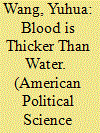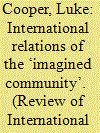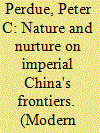|
|
|
Sort Order |
|
|
|
Items / Page
|
|
|
|
|
|
|
| Srl | Item |
| 1 |
ID:
186688


|
|
|
|
|
| Summary/Abstract |
A long tradition in social sciences scholarship has established that kinship-based institutions undermine state building. I argue that kinship networks, when geographically dispersed, cross-cut local cleavages and align the incentives of self-interested elites in favor of building a strong state, which generates scale economies in providing protection and justice throughout a large territory. I evaluate this argument by examining elite preferences related to a state-building reform in eleventh century China. I map politicians’ kinship networks using their tomb epitaphs and collect data on their political allegiances from archival materials. A statistical analysis demonstrates that a politician’s support for state building increases with the geographic size of his kinship network, controlling for a number of individual, family, and regional characteristics. My findings highlight the importance of elite social structure in facilitating state development and help to advance our understanding of state building in China—a useful, yet understudied, counterpoint to the Eurocentric literature.
|
|
|
|
|
|
|
|
|
|
|
|
|
|
|
|
| 2 |
ID:
139587


|
|
|
|
|
| Summary/Abstract |
Benedict Anderson's Imagined Communities has long been established as one of the major contributions to theories of nations and nationalism. Anderson located the rise of national identities within a long-evolving crisis of dynastic conceptions of identity, time, and space, and argued print-capitalism was the key cultural and economic force in the genesis of nations. This article offers a critical appropriation and application of Anderson's theory through two steps. Firstly, it evaluates the conceptual underpinning of his approach through an engagement with recent scholarship on the ‘theory of uneven and combined development’. The fruits of this interchange provide a deeper analytical framework to account for what Anderson calls the ‘modularity’ of national identity, that is, its universal spread across the globe. Modularity is now reconceptualised as a product of combined development with its causal efficacy derived from the latent dynamics of a geopolitically fragmented world. The latter gave shape and form to the new national communities. Secondly, this revised framework is applied to the emergence of Chinese national identity in the late nineteenth century. This allows Chinese nationalism to be recast as an ideological amalgam of indigenous and imported elements that emerged out of the crisis-ridden encounter between Imperial China and Western imperialism in the nineteenth century.
|
|
|
|
|
|
|
|
|
|
|
|
|
|
|
|
| 3 |
ID:
085857


|
|
|
|
|
| Publication |
2008.
|
| Summary/Abstract |
Legitimacy is a key term in political science.It is also a messy one. It can be applied to whole regimes, particular administrations, individual rulers and specific policies.
|
|
|
|
|
|
|
|
|
|
|
|
|
|
|
|
| 4 |
ID:
089363


|
|
|
|
|
| Publication |
2009.
|
| Summary/Abstract |
Ecologies of production and state classifications shaped Chinese imperial frontier policies. In Chinese classical debates about the effect of environment on human character, the dominant view held that all peoples could become civilised, but a dissenting view held that barbarians could never change their ways. Nomadic pastoralists likewise debated whether to adopt certain Han cultural practices or reject them. Chinese dynasties often accepted diversity, but at certain times tried to eliminate difference by persuasion or by force. Three cases illustrate these processes during the Qing period: the relationship between Manchus and Mongols, Qing policies towards aboriginal peoples and the settlement of Taiwan, and Qing policies towards southwestern mountain peoples. In each case, policies came out of the interaction of ethnic categorization, views on cultural transformation and frontier environments. When Qing rulers lost the ability to recognise such cultural distinctions, they lost a key to the endurance of the empire.
|
|
|
|
|
|
|
|
|
|
|
|
|
|
|
|
| 5 |
ID:
132390


|
|
|
|
|
| Publication |
2014.
|
| Summary/Abstract |
The ongoing reallocation of wealth and power from the West to the "rising rest" promises to produce a new pecking order over the course of the next few decades. Although there is a well-developed body of knowledge on the material dimensions of power transitions, existing scholarship provides a much more embryonic intellectual foundation on the normative dimensions of international change. Transitions in the international distribution of power produce not only novel hierarchies, but also novel brands of international order that rest on the social and ideological proclivities of newly powerful states in the system. This article explores the normative dimensions of hegemony by examining the geopolitical, socioeconomic, cultural, and commercial logics that inform different orders. The normative foundations of hegemony are studied across four great powers: the Ottoman Empire, Imperial China, Great Britain, and the United States. The cases reveal that as great powers rise, they as a matter of course seek to push outward to their expanding spheres of influence the norms that provide order within their own polities. Accordingly, today's emerging powers will not embrace the existing international order erected during the West's watch. On the contrary, China and other rising powers will seek to fashion alternative orders based on their own cultural, ideological, and socioeconomic trajectories. If the next international system is to be characterized by a rules-based order rather than competitive anarchy, it will require a new normative consensus that rests on toleration of ideological and political diversity.
|
|
|
|
|
|
|
|
|
|
|
|
|
|
|
|
|
|
|
|
|